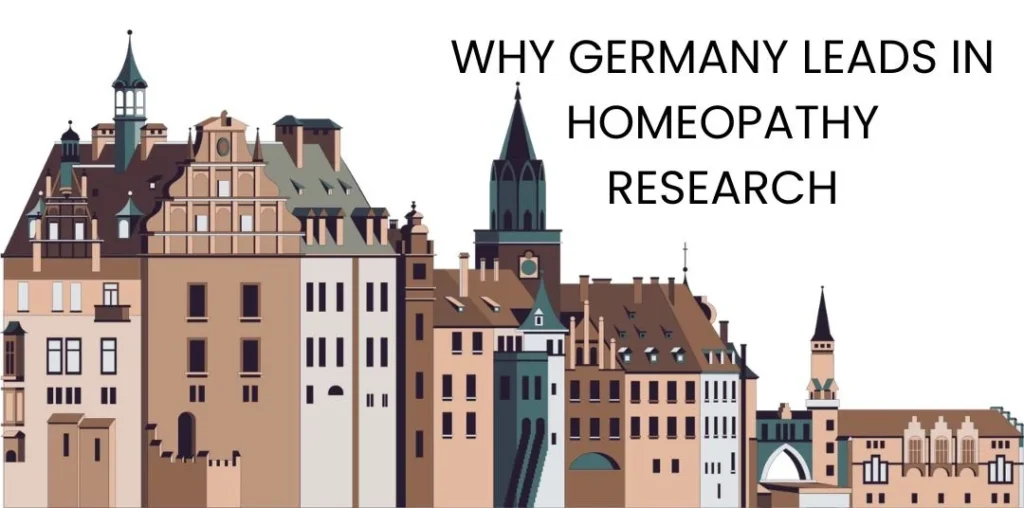Homeopathy has made its mark across the globe, but one country continues to lead the way when it comes to research, education, and integration into healthcare: Germany.
With a rich historical background, world-renowned institutions, and strong cultural acceptance, Germany has become the central hub for homeopathy research.
In this blog post, we’ll take you through the many reasons why Germany holds this prestigious position—and why it’s a place of interest for anyone passionate about homeopathy.
WHY HOMEOPATHY IS GAINING POPULARITY WORLDWIDE
HOMEOPATHY IN DIFFERENT COUNTRIES A GLOBAL PERSPECTIVE ON HEALING

Table of Contents
ToggleGermany: The Birthplace of Homeopathy
It all began in Germany. Samuel Hahnemann, a German physician and the founder of homeopathy, introduced this alternative system of medicine in the late 18th century.
His revolutionary idea of “like cures like” laid the foundation for a medical philosophy that emphasizes natural healing, minimal doses, and individualized treatment.
Hahnemann’s legacy is still very much alive in Germany today.
His original manuscripts, teachings, and personal items are carefully preserved in museums and research institutes.
Germany has stayed true to its roots, turning its historical role into a driving force for modern-day research and application in homeopathy.
Leading Institutions in Homeopathy Research
Germany is home to several prestigious institutions that dedicate themselves to the scientific study and advancement of homeopathy.
1. Institute for the History of Medicine (IGM) – Stuttgart
- Part of the Bosch Health Campus, the IGM is one of the most respected research centers for historical and contemporary homeopathy.
- It houses over 12,000 documents, rare books, and archives related to Samuel Hahnemann and his followers.
- Researchers from all over the world visit the IGM to delve into the historical development of homeopathy and its influence on modern medicine.
2. Institute of Homeopathy and Clinical Pharmacology – Ulm University
- This institute represents the bridge between traditional homeopathic practices and modern clinical pharmacology.
- Researchers here work on integrating homeopathy into contemporary scientific models and clinical applications, helping build credibility and validation in medical circles.
3. Scientific Society for Homeopathy (WissHom) – Köthen
- WissHom is a research-based organization founded in 2010 that promotes scientific investigation and theoretical advancement in homeopathy.
- Their work focuses on evidence-based practices and rigorous research methodologies, aiming to further professionalize and legitimize homeopathy within the medical community.
Academic Integration and Medical Education
- In Germany, homeopathy isn’t treated as a fringe science—it is included in mainstream medical education.
- The Bundesärztekammer (Federal Medical Council) allows licensed medical doctors to acquire an additional qualification in homeopathy.
- This ensures that practitioners are both medically and homeopathically trained, bringing the best of both worlds to patient care.
Institutions like the University of Applied Sciences Fresenius go a step further by offering specialized Master’s programs in Homeopathy and Complementary Medicine.
These programs cover not just homeopathic remedies but also related fields, helping students gain a holistic understanding of alternative medicine.
This academic inclusion significantly enhances the credibility of homeopathy in Germany, setting it apart from many other countries where alternative medicine is less formally recognized.
Advanced Research and Development Facilities
Germany is not just about theory—it’s about experimentation and scientific rigor.
The country boasts state-of-the-art research facilities dedicated to homeopathy.
One prime example is the Water Research Laboratory in Heidelberg.
This facility explores the molecular mechanisms of homeopathic medicines, especially the structure and behavior of water at nanoscales.
This type of research aims to answer one of the most debated questions in the scientific world: How do homeopathic remedies work when diluted to such extreme levels?
These ongoing studies are vital in presenting homeopathy not as pseudoscience, but as a legitimate field worthy of empirical investigation.
Public Perception and Usage
- One of the most compelling aspects of homeopathy in Germany is its widespread acceptance among the public.
- Surveys show that a significant portion of the German population uses homeopathic remedies for both acute and chronic conditions.
- Whether it’s the common cold, allergies, or more complex autoimmune disorders, many Germans turn to homeopathy for safe and gentle healing.
- The reason? Trust. Generations have grown up with homeopathy as a part of their wellness culture.
- Pharmacies readily offer homeopathic remedies, and many general practitioners include them in their practice.
- This makes homeopathy not just a medical choice, but a cultural norm in Germany.
Favourable Regulatory Environment
- Germany’s government and medical boards recognize the value of homeopathy, providing it with a supportive legal framework.
- Homeopathic medicines are officially acknowledged and regulated.
- They meet strict production and labeling guidelines, ensuring consumer safety and trust.
Moreover, many German health insurance providers reimburse the cost of homeopathic treatments, making them accessible to a wider audience.
This kind of integration into the national healthcare system is rare globally, placing Germany far ahead in terms of alternative medicine support.
Why Germany Leads in Homeopathy
Let’s summarize the key reasons:
- Historical significance: Birthplace of Samuel Hahnemann and early homeopathy
- Academic and professional integration: Recognized qualifications and university programs
- Dedicated institutions: World-class research centers and archives
- Scientific research: Ongoing studies on efficacy and mechanisms
- Public trust: High usage and cultural acceptance
- Government support: Legal recognition and insurance coverage
Each of these factors reinforces the others, creating a strong, interlinked ecosystem for the growth and development of homeopathy.
Final Thoughts: A Model for the World
Germany sets a global benchmark for how homeopathy can be seamlessly integrated into modern healthcare systems.
Whether you’re a medical student, researcher, or someone simply curious about alternative medicine, Germany offers a wealth of opportunities and insights.
If you’re ever in the country, don’t miss visiting the Institute for the History of Medicine in Stuttgart or attending a lecture at the University of Applied Sciences Fresenius.
You might just find yourself inspired by the depth and professionalism with which Germany embraces homeopathy.
Homeopathy has a home—and that home is Germany.
